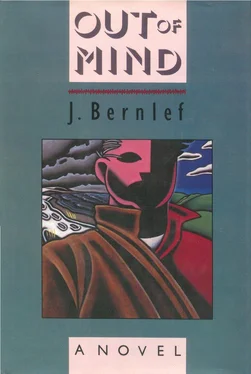'My favourite place to sit was under the desk. I'd push the chair back and crawl underneath the desk with a book. The Travels and Adventures of Captain Hatteras. In the end he went mad from all that whiteness around him. He ended up in an institution. While he was there he used to walk all the time in a northerly direction. Until he couldn't go any further. Until he ran into a wall. Then he would stand still for hours.'
Outside, a woman walks down a snowy garden to a blue car. She waves. I wave back. People are friendly here, that cannot be denied. She starts the car and reverses out of a drive (the view would be less empty, easier to cope with, if trees, like people, all had a name of their own).
A girl opposite me asks, why I am rubbing the wood with my left hand.
'Otherwise I can't see the hand any longer.'
'See?'
'Yes.'
'Otherwise you can't feel your left hand any longer?'
'More or less. Yes, exactly. As I said.'
She has picked up an oblong book and opens it. Black pages. She turns the book over and pushes it towards me.
'No pictures, please.'
'But it's your own photo album.'
In order to please her I leaf through it. Wedding photos. Photos of children. I turn the album round and point at one of them.
'I never see them anymore. Kitty was supposed to come over. Have you met her?'
'I'm sure she'll come.'
'And Fred even less. You never see them anymore. They're no longer your children.' (Try not to cry now.)
'What's this?' She puts her finger on a photograph of a man walking beside a wide river. Across the water there is a row of big houses, strung along the bank which lies in the shade. The man is walking in the sun along a quay wall. He looks sideways into the camera.
'A river,' I say. 'The Rhine, maybe?'
'But who is that man?'
'Could it be me?'
'Of course. You haven't changed that much.'
'Yes, now that you say so, it is me. But I'm not so sure about the river. The Rhine?'
'And who is that?'
A woman in a little black hat with fluttering veil, pushing a baby carriage. Old-fashioned, tailored two-piece suit.
'Mama I suppose. My mother, I mean, I beg your pardon. With me.' I look from the photograph to her face. 'Or am I wrong?'
'Have another look.'
'I honestly don't know just now.'
'It's your wife. It's Vera.'
'Please put the book away.'
'You must go on looking. If you go on looking and you think of her very hard, you're sure to recognize her again.'
'She has changed. Or maybe I am the one who has changed. She is a beautiful woman.'
'She is still beautiful now.'
I nod. Yes, she will remain beautiful for ever, with those green eyes behind that veil pleated forever by the wind.
'The waters broke,' I say. 'All of a sudden. As if it was raining. She clutched at my shoulders. I got drenched.'
Again I look at the photograph of the woman with the baby carriage, at the veil that seems to want to fly away, at her narrow, hopeful face. Slowly and cautiously I nod. Then I start to talk. A story. A story about the woman with the hat and the veil. Vera. I place her with the baby carriage on the edge of Amsterdam. That is where she lives. I talk about the child in the carriage, who cannot be seen in the photograph but who is my son Fred in the story. I talk about the fields, the glasshouses, the ditches and the footbridges, which lie outside the rectangle of the photograph. I talk about the time in which the photograph was taken, the last year of the war. This does not altogether tally with the tailored suit, but this girl sitting here won't know that, she belongs to a generation born long after the war and in another continent. She nods and she listens. I talk. About the blocked sewers (because the Germans had turned off the electricity in the pumping stations) so that everywhere in the streets deep shit holes were being dug that stank horribly and created a real risk of infectious diseases like cholera and typhoid. I talk about old, stooping Mr Mastenbroek on the third floor who died of starvation two days before the liberation. You can't imagine that now, I say. What hunger is like. That dull, gnawing feeling, which resided not only in your stomach but everywhere. All your thoughts were governed by it. I talk of the arrival of the Canadians and Americans. Eisenhower's and Churchill's triumphal tour of the city in an open limousine. How I stood among the crowds with Fred on my shoulders and tears running down my cheeks. About the freedom celebrations, the first bar of chocolate, the biscuit porridge (thick and nourishing and at first too rich for my stomach, which for months had feasted only on sugarbeet and fried slices of tulip bulb). How everyone fell in love with life again, with one another, how many children were born in the Netherlands roughly a year after that 5 May. I talk and talk and it is as if I am talking myself out of history, as if this were a book from which I am reading, or a text I know by heart; one thing is clear: what you tell you lose. Forever. Abruptly I fall silent and look around in alarm.
Robert is not lying in his usual place. I ask a girl walking about where Robert, my dog, is.
'Vera has taken him with her to Gloucester.'
'But he has to be taken out for a walk at this time.'
'Your wife will see to that.'
'How long will she be away?'
'Not long.'
'Do you know where Robert is?'
'Gone to Gloucester with your wife. In the car.'
'Why didn't she say she was going? Is that why you're here?'
'In a way.'
'I don't mind if you go home. I don't need to be looked after, you know. On the contrary, I rather like being on my own.'
'I'll stay for a while, anyway.'
'As you like. But tell me who you are first. '
'Phil Taylor.'
'The name doesn't ring a bell, but I've always had a bad memory for names. Phil. I suppose you must be a friend of my daughter's, are you? My daughter doesn't live here, though. Never has done. You never see them any more.'
'She'll come.'
'Do you think so? Pop always reproached me that I visited him so seldom. And then he dies and no amends can ever be made. That is the worst of it, believe you me, when someone dies. Those that are left behind have for ever fallen short. All guilt feelings are based on that.'
'Would you like us to go for a little walk?'
'No. I'm waiting for the spring. It can't be long now. I don't mind telling you that I hate the winters here. In November when you hear the foghorn of the lighthouse near here wailing all day, you know it has started again. The cold, the dark, the snow, carrying logs. Have you seen the dog anywhere? His name is Robert.'
'He's gone with your wife.'
'I like that! That's against the agreement. I'm the one who takes the dog out here.'
'He wanted to go with her.'
'I used to be able to take him out only at weekends, but now I have plenty of time. He's getting rather old. The hair around his snout is getting quite grey.'
'Do you mind if I watch television for a while?'
'Of course not, dear. Make yourself at home.'
Yes. I ought to go and visit Pop some time. Of course he'll start talking about the war, as usual. The same old stories about hunger, journeys, rheumatism and his neighbour who joined the Nazi Defence and whom he never looked in the face again. And when he has finished talking about the war he winds his old portable phonograph and puts on Beethoven's second piano concerto. A complete album of big heavy shellac records. I ought to give him my record player. He'd love that. There's an empty carton in the kitchen. I think it would fit in it exactly.
A young woman (where has she suddenly sprung from, is the front door open by any chance?) tries to push me away from the record player.
'I will not be prevented, miss. My father sits at home with one of those old wind-up phonographs and music is the only comfort and refuge left to him. Clear, bright and unfathomable. Perhaps you could lend me a hand packing it.'
Читать дальше






![Джон Харгрейв - Mind Hacking [How to Change Your Mind for Good in 21 Days]](/books/404192/dzhon-hargrejv-mind-hacking-how-to-change-your-min-thumb.webp)




